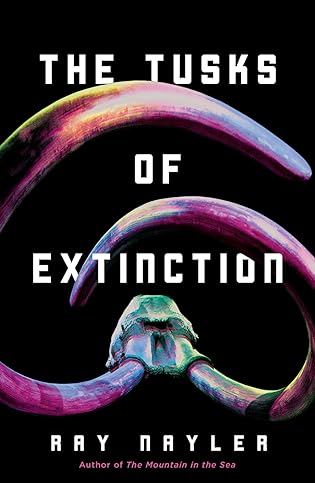 The Tusks of Extinction by Ray Nayler
The Tusks of Extinction by Ray Nayler Format: eARC
Source: supplied by publisher via Edelweiss
Formats available: hardcover, ebook, audiobook
Genres: climate fiction, science fiction
Pages: 192
Published by Tordotcom on January 16, 2024
Purchasing Info: Author's Website, Publisher's Website, Amazon, Barnes & Noble, Kobo, Bookshop.org, Better World Books
Goodreads
When you bring back a long-extinct species, there’s more to success than the DNA.
Moscow has resurrected the mammoth, but someone must teach them how to be mammoths, or they are doomed to die out, again.
The late Dr. Damira Khismatullina, the world’s foremost expert in elephant behavior, is called in to help. While she was murdered a year ago, her digitized consciousness is uploaded into the brain of a mammoth.
Can she help the magnificent creatures fend off poachers long enough for their species to take hold?
And will she ever discover the real reason they were brought back?
A tense eco-thriller from a new master of the genre.
At the Publisher's request, this title is being sold without Digital Rights Management Software (DRM) applied.
My Review:
When we first slip into Dr. Damira Khismatullina’s mind she is fighting the long defeat against ivory poachers along the banks of the Ewaso Ng’iro River in Kenya. She and her colleagues are losing the battle, and they know it. But they can’t stop fighting because they know that something precious will be lost if they can’t save the elephants.
She doesn’t know that she’s already lost; the battle, the war, and even her life, in a cause that is so very worthy against an implacable enemy that can’t be defeated but only delayed. Because her real enemy, the elephants’ true foe, isn’t poachers. It’s human greed. And that’s inexhaustible.
Dr. Damira may have lost her battle, but she’s not the only one fighting this war and conventional methods are not the only way to fight it. Because it’s not just about the elephants. It’s about the planet that made them.
Which is where Damira the mammoth comes into this story. Russian scientists have created a frigid version of Jurassic Park in the taiga, and have brought back not dinosaurs but mammoths in the hopes of pushing back climate change – at least a bit – by protecting and expanding the taiga and ultimately halting, or at least slowing, the melting of the permafrost.
But the newly resurrected mammoths are dying. They don’t know how to BE mammoths, and the captive elephants they were bred from didn’t even have the skills of how to be a wild elephant to teach them. But Dr. Damira Khismatullina did. Or does, as she was the last remaining expert on elephant behavior in the wild.
But she’s dead. The poachers killed her. And delivered her head back to the government to send the message that no one was permitted to even attempt to control the slaughter.
Compared to resurrecting an entire extinct species, implanting Dr. Khismatullina’s consciousness into a single member of that species was a piece of cake. So Damira the mammoth was reborn as the matriarch of the mammoth herd. She taught them to BE mammoths – or at least close enough for them to survive and even thrive in their new environment.
Just in time for the ivory hunters to find them. But Damira the mammoth matriarch has very different imperatives than Dr. Khismatullina the scientist did. And considerably more weapons at her disposal.
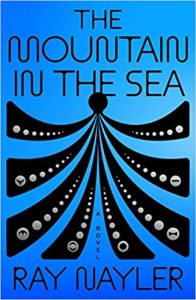 Escape Rating A-: I picked this one up because I utterly adored the author’s debut novel, The Mountain in the Sea. I mean I really, truly, seriously loved that book. To the point where I’ll be picking up everything he writes for years to come.
Escape Rating A-: I picked this one up because I utterly adored the author’s debut novel, The Mountain in the Sea. I mean I really, truly, seriously loved that book. To the point where I’ll be picking up everything he writes for years to come.
But that was so damn good that while I had hoped that The Tusks of Extinction would be good, I didn’t even expect that the lightning of that first book would fit into the novella-sized bottle of Tusks. Which it doesn’t – quite. Howsomever, that does not in any way mean that Tusks isn’t good, more that it has a VERY high bar to get over and not nearly as much space to run up to it.
The ecoterrorism that forms the background of The Tusks of Extinction is, unfortunately, very much like the mess the world has become in The Mountain in the Sea, something we can see all too clearly from here. Elephants NEED their tusks. Humans do not NEED ivory. They just want it because it’s rare and it’s difficult to obtain, and it’s precious because of those factors.
And humans are so very greedy, which explains the state of the world in a nutshell. (I digress, but only sorta/kinda. Dammit.)
So there’s a whole lot of sad hanging over this story, again, as there was in The Mountain in the Sea. But without that joy of discovery that carried Mountain, and without that surprising, albeit equivocal, sweetly bitter ending to a story that I expected to end in all bitter all the way down.
Also, as a science fiction reader, I wish that The Tusks of Extinction had a bit more time to explain how Russian science managed to reach BOTH the ability to resurrect an extinct species à la Jurassic Park AND the science needed to implant consciousness anywhere at all, let alone into another species, formerly extinct or otherwise. THAT story would be fascinating and we only get the barest hints of it here.
All of that being said, what makes this story work is the juxtaposition of the evolution of the new mammoths set against the total lack thereof of the humans that Damira left behind. Even though that evolution is likely to leave her fighting the long defeat yet again. At least this time around she has considerably better weaponry and is unlikely to live to see its ending.

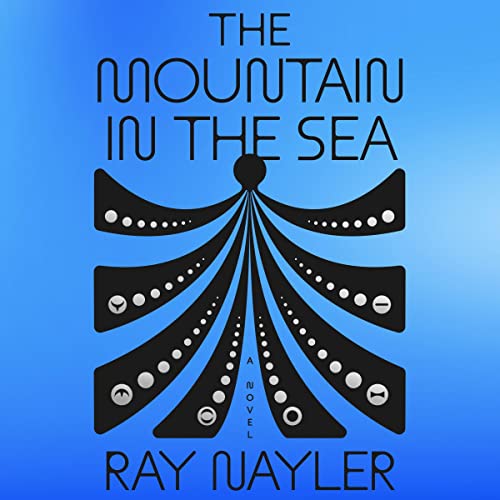 The Mountain in the Sea by
The Mountain in the Sea by 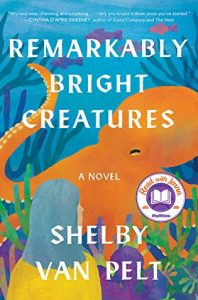 In the waters off Con Dau, DIANIMA Corporation has discovered a pod of octopuses that might, just possibly, have achieved not just a similar level of intelligence to humans, but have also independently developed the skills that vaulted humans to the top of the food chain. DIANIMA has brought Dr. Ha Nguyen to Con Dau because she quite literally wrote the book on the possibility of intelligent, communicating life developing in the world’s oceans.
In the waters off Con Dau, DIANIMA Corporation has discovered a pod of octopuses that might, just possibly, have achieved not just a similar level of intelligence to humans, but have also independently developed the skills that vaulted humans to the top of the food chain. DIANIMA has brought Dr. Ha Nguyen to Con Dau because she quite literally wrote the book on the possibility of intelligent, communicating life developing in the world’s oceans.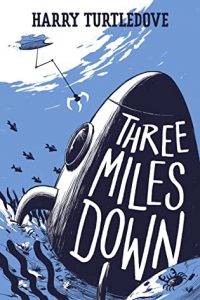 So what this story does, and does well, is to convey just the smallest sliver of how difficult it will be to find common ground with a species that doesn’t communicate the way we do, doesn’t have the same species imperatives, doesn’t move through its world the way we do, doesn’t use any body language we recognize. There’s not going to be the equivalent of the Rosetta Stone. It’s Dr. Ha Nguyen’s job to create one from scratch, while never being certain that her interpretation is anywhere near the correct target – let alone hitting a ‘bull’s eye’. If her base assumptions are off base, everything that follows after will be gibberish – with potentially catastrophic consequences.
So what this story does, and does well, is to convey just the smallest sliver of how difficult it will be to find common ground with a species that doesn’t communicate the way we do, doesn’t have the same species imperatives, doesn’t move through its world the way we do, doesn’t use any body language we recognize. There’s not going to be the equivalent of the Rosetta Stone. It’s Dr. Ha Nguyen’s job to create one from scratch, while never being certain that her interpretation is anywhere near the correct target – let alone hitting a ‘bull’s eye’. If her base assumptions are off base, everything that follows after will be gibberish – with potentially catastrophic consequences.